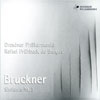Bruckner Symphony No 3
Solid playing but bandmaster Bruckner doesn’t stand up against the old-timers
View record and artist detailsRecord and Artist Details
Composer or Director: Anton Bruckner
Genre:
Orchestral
Label: Genuin
Magazine Review Date: 9/2007
Media Format: CD or Download
Media Runtime: 58
Mastering:
Stereo
DDD
Catalogue Number: GEN87086

Tracks:
| Composition | Artist Credit |
|---|---|
| Symphony No. 3 |
Anton Bruckner, Composer
Anton Bruckner, Composer Dresden Philharmonic Orchestra Rafael Frühbeck de Burgos, Conductor |
Author: Richard Osborne
Bruckner was adamant that this tidied and foreshortened 1889 version of his 1873 Third Symphony was the one conductors should use. Though his pupil Franz Schalk had begun the tidying process and though an infuriated Gustav Mahler tried to stop it (he had produced a piano transcription of an earlier version), Bruckner became so involved with reworking the finale that he eventually went back over the whole work. Uncomfortable as it may be for some, there is no gainsaying the authenticity of this final version.
Given that structural weaknesses still remain, any performance requires a firm hand on the tiller, something the best mid-century Brucknerians – Barbirolli, Böhm, Celibidache and, among conductors of complete cycles, Jochum, Karajan and Wand – were fully capable of providing. Blaze, vision, consistency, control: call it what you will, they all exhibit these qualities to a greater or lesser degree.
The conducting of Rafael Frühbeck de Burgos has never been less than firm. He made his name in the mid-1960s with classic recordings of the music of Manuel de Falla. In his latest incarnation as principal conductor of the Dresden Philharmonic (an ensemble barely less venerable than the revered Staatskapelle) he shows that he has lost none of his old command and control. This, allied to solid orchestral playing and predictably fine Lukaskirche sound, gives the performance its merit. That said, it is not an especially idiomatic account of a work where dance subjects haunt the memory. Heard alongside Böhm, Barbirolli (caught in dyspeptic 1960s radio sound, alas) or the leisurely but equally well recorded Celibidache, Frühbeck is a bit too much the municipal bandmaster.
Given that structural weaknesses still remain, any performance requires a firm hand on the tiller, something the best mid-century Brucknerians – Barbirolli, Böhm, Celibidache and, among conductors of complete cycles, Jochum, Karajan and Wand – were fully capable of providing. Blaze, vision, consistency, control: call it what you will, they all exhibit these qualities to a greater or lesser degree.
The conducting of Rafael Frühbeck de Burgos has never been less than firm. He made his name in the mid-1960s with classic recordings of the music of Manuel de Falla. In his latest incarnation as principal conductor of the Dresden Philharmonic (an ensemble barely less venerable than the revered Staatskapelle) he shows that he has lost none of his old command and control. This, allied to solid orchestral playing and predictably fine Lukaskirche sound, gives the performance its merit. That said, it is not an especially idiomatic account of a work where dance subjects haunt the memory. Heard alongside Böhm, Barbirolli (caught in dyspeptic 1960s radio sound, alas) or the leisurely but equally well recorded Celibidache, Frühbeck is a bit too much the municipal bandmaster.
Discover the world's largest classical music catalogue with Presto Music.

Gramophone Digital Club
- Digital Edition
- Digital Archive
- Reviews Database
- Full website access
From £8.75 / month
Subscribe
Gramophone Full Club
- Print Edition
- Digital Edition
- Digital Archive
- Reviews Database
- Full website access
From £11.00 / month
Subscribe
If you are a library, university or other organisation that would be interested in an institutional subscription to Gramophone please click here for further information.




